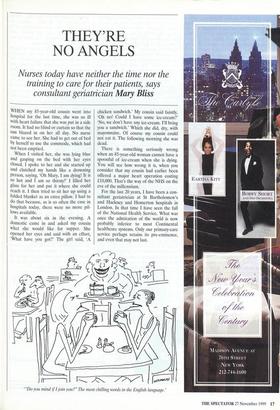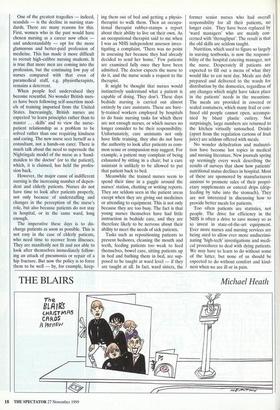THEY'RE NO ANGELS
Nurses today have neither the time nor the training to care for their patients, says consultant geriatrician Mary Bliss
WHEN my 85-year-old cousin went into hospital for the last time, she was so ill with heart failure that she was put in a side room. It had no blind or curtain so that the sun blazed in on her all day. No nurse Came to see her. She had to get out of bed by herself to use the commode, which had not been emptied.
When I visited her, she was lying blue and gasping on the bed with her eyes Closed. I spoke to her and she started up and clutched my hands like a drowning person, saying, 'Oh Mary, I am dying! It is so hot and I am so thirsty!' I filled her glass for her and put it where she could reach it. I then tried to sit her up using a folded blanket as an extra pillow. I had to do that because, as is so often the case in hospitals today, there were no more pil- lows available.
It was about six in the evening. A domestic came in and asked my cousin what she would like for supper. She opened her eyes and said with an effort, 'What have you got?' The girl said, 'A
chicken sandwich.' My cousin said faintly, 'Oh no! Could I have some ice-cream?' 'No, we don't have any ice-cream. I'll bring you a sandwich.' Which she did, dry, with mayonnaise. Of course my cousin could not eat it. The following morning she was dead.
There is something seriously wrong when an 85-year-old woman cannot have a spoonful of ice-cream when she is dying. You will see how wrong it is, when you consider that my cousin had earlier been offered a major heart operation costing £10,000. That's the way of the NHS on the eve of the millennium.
For the last 20 years, I have been a con- sultant geriatrician at St Bartholomew's and Hackney and Homerton hospitals in London. In that time I have seen the fall of the National Health Service. What was once the admiration of the world is now probably inferior to most Continental healthcare systems. Only our primary-care service perhaps retains its pre-eminence, and even that may not last.
"Do you mind if I join you?" The most chilling words in the English language.'
One of the greatest tragedies — indeed, scandals — is the decline in nursing stan- dards. There are many reasons for this. First, women who in the past would have chosen nursing as a career now often — and understandably — opt for the more glamorous and better-paid profession of medicine. This has made it more difficult to recruit high-calibre nursing students. It is true that more men are coming into the profession, but the continuing low pay of nurses compared with that even of paramedical staff, e.g. physiotherapists, remains a deterrent.
When people feel undervalued they become resentful. No wonder British nurs- es have been following self-assertion mod- els of training imported from the United States. Increasingly, British nurses are expected `to learn principles rather than to master ... skills' and to view the nurse- patient relationship as a problem to be solved rather than one requiring kindness and caring. The new nurse sees herself as a consultant, not a hands-on carer. There is much talk about the need to supersede the Nightingale model of the nurse as a 'hand- maiden to the doctor' (or to the patient), which, it is claimed, has held the profes- sion back.
However, the major cause of indifferent nursing is the increasing number of depen- dent and elderly patients. Nurses do not have time to look after patients properly, not only because of understaffmg and changes in the perception of the nurse's role, but also because patients do not stay in hospital, or in the same ward, long enough.
The imperative these days is to dis- charge patients as soon as possible. This is not easy in the case of elderly patients, who need time to recover from illnesses. They are manifestly not fit and not able to look after themselves immediately follow- ing an attack of pneumonia or repair of a hip fracture. But now the policy is to force them to be well — by, for example, keep-
ing them out of bed and getting a physio- therapist to walk them. Then an occupa- tional therapist rubber-stamps a report about their ability to live on their own. As an occupational therapist said to me when I was an NHS independent assessor inves- tigating a complaint, 'There was no point in assessing her because they had already decided to send her home.' Few patients are examined fully once they have been admitted. The doctor expects the nurse to do it, and the nurse sends a request to the therapist.
It might be thought that nurses would instinctively understand what a patient is capable of doing. They don't. These days bedside nursing is carried out almost entirely by care assistants. These are bare- ly-trained workers employed by hospitals to do basic nursing tasks for which there are not enough nurses, or which nurses no longer consider to be their responsibility. Unfortunately, care assistants not only have little training, they also do not have the authority to look after patients as com- mon sense or compassion may suggest. For example, a patient may complain of being exhausted by sitting in a chair; but a care assistant is unlikely to be allowed to put that patient back to bed.
Meanwhile the trained nurses seem to spend their time in a gaggle around the nurses' station, chatting or writing reports. They are seldom seen in the patient areas except when they are giving out medicines or attending to equipment. This is not only because they are too busy. The fact is that young nurses themselves have had little instruction in bedside care, and they are therefore likely to be nervous about their ability to meet the needs of sick patients.
Tasks such as repositioning patients to prevent bedsores, cleaning the mouth and teeth, feeding patients too weak to feed themselves, bowel care, sitting patients up in bed and bathing them in bed, are sup- posed to be taught at ward level — if they are taught at all. In fact, ward sisters, the former senior nurses who had overall responsibility for all their patients, no longer exist. They have been replaced by 'ward managers' who are mainly con- cerned with 'throughput'. The result is that the old skills are seldom taught.
Nutrition, which used to figure so largely in nursing textbooks, is now the responsi- bility of the hospital catering manager, not the nurse. Desperately ill patients are expected to fill out a menu of what they would like to eat next day. Meals are duly prepared and delivered to the wards for distribution by the domestics, regardless of any changes which might have taken place in the patients' needs in the meantime. The meals are provided in covered or sealed containers, which many frail or con- fused old people cannot open, accompa- nied by blunt plastic cutlery. Not surprisingly, large numbers are returned to the kitchen virtually untouched. Drinks (apart from the regulation cartons of fruit juice) are seldom offered with meals.
No wonder dehydration and malnutri- tion have become hot topics in medical and nursing literature. New joumals spring up seemingly every week describing the results of surveys that show how patients' nutritional status declines in hospital. Most of these are sponsored by manufacturers anxious to promote sales of their propri- etary supplements or enteral drips (drip- feeding by tube into the stomach). They are not interested in discussing how to provide better meals for patients.
Too often patients are statistics, not people. The drive for efficiency in the NHS is often a drive to save money so as to invest in state-of-the-art equipment. Ever more nurses and nursing services are being axed to allow ever more undiscrimi- nating 'high-tech' investigations and medi- cal procedures to deal with dying patients. We may have to learn to do without some of the latter, but none of us should be expected to do without comfort and kind- ness when we are ill or in pain.



























































































 Previous page
Previous page